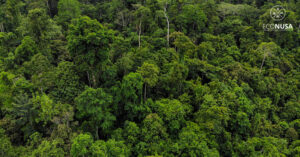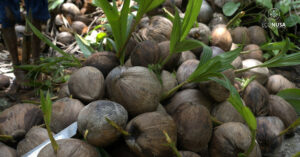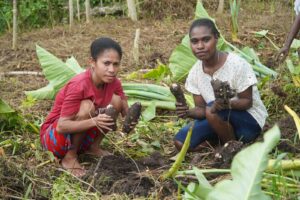
Paniai Regency, Papua, is located at Trans Nabire track in the midpoint of Papuan mountain areas. The area has fascination and abundant natural richness. Coffee is one of them. The commodity is the Papuan natural resource that becomes blessing and hope for the surrounding community. It is no wonder that Pania people call coffee red gold as it can be harvested any time without destroying nature and ecology.
Hanok Herison Pigai, one of coffee activists in Paniai Regency, told a story of coffee. Hanok is the native Papuan who becomes the main mentor for Arabican coffee talk at national level. He also chairs the Development Foundation for Papuan Community Welfare (Yapkema Papua). Hanok assisted EcoNusa team to pay a visit the village surrounding Paniai lake.
“Coffee has become the hope for villagers’ future. Coffee is like gold that could be picked and harvested and inherited to the next generation without putting nature and environment at risk. It need not to sell the land to outsider businessperson for mining spot or palm oil plantation,” said Hanok. He shared about the spirit of Paniai villagers to plant coffee.
Hanok took EcoNusa team to visit coffee farmers at Paniai. After taking two-hour travel through lake and river, EcoNusa arrived at Toyaimoti Village, Agadide District. EcoNusa team met Kris Kadepa, one of coffee farmers. He is one of coffee farmer pioneers in Yapkema Papua.
Read also: Paniai Coffee at Glance
Kris is the son of former village chief who pioneered the coffee planting in the village. Kris has private grounds to plant coffee inherited by his parents. The plot is not too spacious but well-managed. In this plot, Kris plants around 300 coffee trees. To shelter the coffee trees, he plants guava-like trees, cypress and lamtoro to create shady ambiance. “The coffee on my private ground always has fruit so that it can be picked any time,” Kris said.
He actively invited his fellows and other families in Agadide District to plant coffee. Kris provides the coffee seeds and share them for free to other people who wants to plant coffee. On the other ground, Kris has planted around 2,000 coffee trees.
After picking, Kris handles the coffee with dry process system. All is done manually. He uses machine he got from the government aid to peel off the bean skin. But the rests of peeling are done manually. His wife and parents assisted him to undertake the whole processes before selling them to downtown.
The drying process still relies on direct sunlight on the zinc as the floorcovering on the ground. “The process made most of coffee farmers reluctant to plant coffee. The process needs patience. But their reluctance is due mainly to the absence of market,” Kris added.
As to Kris, coffee is for his livelihood. In one crop, Kris could bring the coffee to downtown and sell them to Yapkema with a good price. He could bring at least 10 kilograms of green bean, and sometimes 50 kilograms. “It costs up to IDR 80,000 per kilogram. The price might be lower or higher depending on the coffee quality,” he said.
Formerly, when there were no permanent buyers, he just stockpiled his coffee at the warehouse. Even when there is a buyer, all green bean had the same prices of IDR 30,000-50,000 per kilogram regardless the quality.
Coffee has become the hopefulness and future for his family and the other 400 coffee farmers in Paniai as coffee keeps growing and giving fruit. The coffee is planted and processed with heart, picked up with love to be served on a cup of coffee for the coffee lover who comes far from his home. To people in Paniai, coffee is for survival and hope.
Editor: Leo Wahyudi




